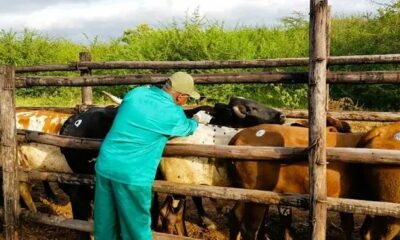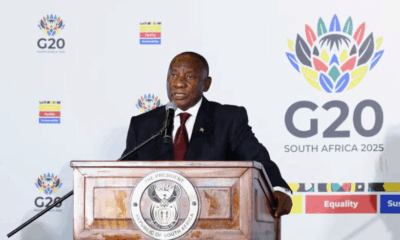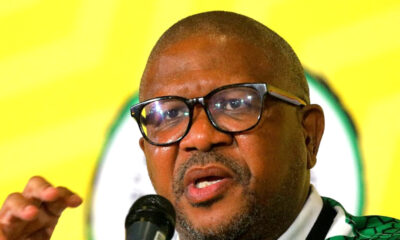411
Why Trump Got It So Wrong: The Real Story of Black Farmers in South Africa

When South African President Cyril Ramaphosa sat down with former US President Donald Trump at the White House on May 21, there was hope the discussion would be grounded in facts. That’s what we expect from world leaders — that their words are backed by real data and sound advice from experts.
But what played out in front of the cameras was far from informed. It was disturbing. Trump made headlines by blurting out a deeply misinformed claim: “But Blacks are not farmers.” The phrase hung in the air, echoing through newsrooms and social media feeds with disbelief.
And for anyone familiar with the actual makeup of South Africa’s agriculture, the statement wasn’t just inaccurate — it was deeply insulting.
South Africa’s farmers: more black than white
Let’s start with what the numbers actually say. In contrast to Trump’s blunt dismissal, black South Africans are not only active in agriculture, they make up the majority of farmers in the country.
Sure, white farmers account for a large share of commercial output — around 90% by some estimates — but that doesn’t mean black farmers aren’t farming. In fact, the most recent credible data, including the 2011 population census and the 2016 Community Survey, tells a different story.
Out of over 2.8 million households involved in agriculture, 93,000 black farming households report agriculture as their main source of income, compared to just over 43,000 white ones. So yes, black farmers exist. They’re working the land. They’re feeding communities. And they’re growing food under often more difficult circumstances, with far less support and fewer resources.
The silence that speaks volumes
What’s perhaps even more surprising than Trump’s gaffe is the response it got — or rather, didn’t get. Not one major farmers’ union in South Africa stood up publicly to correct the record. Not a single loud rejection of Trump’s comments from those who supposedly represent agriculture.
It’s hard not to wonder: is this silence tactical? Are some of these groups benefiting from a narrative that sidelines black farmers? The lack of pushback sends a message — one that doesn’t align with reality and certainly doesn’t serve the future of South Africa’s agricultural economy.
And what’s at stake isn’t just reputational damage. If falsehoods like these fuel US policy shifts, the impact could be massive. The US is a key export market for South African agriculture, accounting for 4% of the country’s $13.7 billion in exports in 2024. Trade barriers based on bad data would hurt farmers of all backgrounds.
Two agricultures, one future
South Africa’s agricultural sector is often described as “dualistic.” On one side, large-scale commercial operations — predominantly white-owned. On the other, a sea of small and micro-scale farms, overwhelmingly operated by black South Africans.
But here’s the nuance that Trump’s off-the-cuff remark missed entirely: size and scale don’t determine value or legitimacy. Many black farmers operate micro or small farms that don’t qualify for VAT registration. That’s not a reflection of failure. It’s a reflection of how uneven the playing field still is — due to a legacy of exclusion and an ongoing lack of support.
Yet these farmers are crucial. They form the backbone of rural food systems, keep families and villages fed, and carry forward a tradition of working the land that stretches back generations.
Counting what matters and what’s hard to count
One of the challenges in this whole debate is that South Africa doesn’t have perfectly comprehensive data. The 2007 and 2017 agricultural censuses were limited to VAT-registered farms, which means many small-scale black farmers weren’t even counted.
When you step outside the confines of those surveys and look at broader data, a clearer picture emerges: Black farmers are very much part of the present and future of South African agriculture.
And let’s not forget: the majority of farm laborers, packers, and even those in the broader distribution system are black. Their sweat, their hands, and their skills are in every bag of produce that lands in shops, in every crate that leaves for export.
A call for facts, fairness and recognition
What South Africa doesn’t need is more noise from uninformed commentators who haven’t done the work to understand our context. What we do need is truth. We need policy rooted in data, support for farmers of all sizes and backgrounds, and a global narrative that reflects the real South Africa — not one invented in a soundbite.
So, here’s the takeaway: Black people in South Africa are farmers. They may need more support. They may still be fighting for equal access and recognition. But they are here, and they are feeding the nation.
Let’s make sure the world knows it.
Speak up, share the truth
If you care about facts, food security, and fair representation, don’t let falsehoods stand unchallenged. Share this story. Start conversations. Support black farmers. And when leaders speak without facts, hold them accountable. Because the truth matters — especially when it’s growing in our soil.
{Source: IOL}
Follow Joburg ETC on Facebook, Twitter , TikTok and Instagram
For more News in Johannesburg, visit joburgetc.com



























